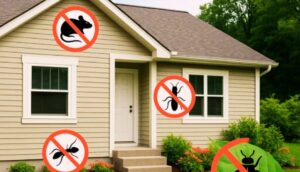How To Keep Mice Out This Fall: Your Ultimate Guide

When fall arrives, cozy sweaters and warm drinks aren’t the only things that come out. Mice also start looking for shelter. Your home is warm, safe, and full of food—a perfect hideout for them. If you want to avoid unwelcome furry visitors this season, you’re in the right place.
In this guide, we’ll cover how to keep mice out this fall with practical, easy-to-follow steps. Whether you’re dealing with a current problem or just want to prevent one, you’ll find helpful tips here.
Why Mice Love Fall
When temperatures drop, mice seek warmth and food indoors. Your home is a five-star hotel for them. They can sneak in through tiny cracks—as small as a dime! Once inside, they build nests, chew wires, and contaminate food. This makes prevention essential before they settle in.
Step 1: Seal Entry Points
Mice are escape artists. The first step is keeping them out completely.
- Inspect your home: Walk around the outside of your house. Look for cracks, holes, and gaps.
- Seal with steel wool: Mice hate chewing through it. Combine it with caulk for a tight seal.
- Check vents and chimneys: Install screens or covers.
- Weatherstrip doors: Gaps under doors are easy entryways.
Do this before the weather gets too cold. Once they are in, it’s harder to get them out.
Step 2: Keep Food Sealed

Mice possess a highly developed sense of smell. Don’t give them a reason to stay.
- Store grains, cereal, and pet food in airtight containers.
- Clean crumbs and spills right away.
- Take out the trash daily.
- Don’t leave pet food out overnight.
Less food means fewer reasons for mice to stay.
Step 3: Declutter and Clean
Clutter makes great hiding spots.

- Organize garages, basements, and attics.
- Use sealed bins instead of cardboard boxes.
- Vacuum regularly and mop floors.
- Wipe counters and sweep crumbs.
Clean spaces make it hard for mice to hide and nest.
Step 4: Use Natural Deterrents
If you prefer non-toxic solutions, natural repellents can work.
- Peppermint oil: Soak cotton balls and place them near entry points.
- Cloves or cinnamon: These strong scents repel rodents.
- Vinegar spray: Wipe counters with it to mask food smells.
These won’t replace sealing gaps, but they can make your home less appealing.
Step 5: Set Traps Early

Even if you don’t see mice yet, traps are a good precaution.
- Snap traps: Classic and effective.
- Use Live traps: For persons who prefer a humane approach.
- Electronic traps: Quick and efficient.
Place traps along walls and near suspected entry points. Check them daily.
Step 6: Maintain Your Yard
Your yard is the first line of defense.

- Keep grass trimmed short.
- Remove woodpiles near the house.
- Clean up fallen leaves and debris.
- Store firewood at least 20 feet from the home.
A tidy yard discourages rodents from hanging around.
Step 7: Call a Professional if Needed

If the problem is big, call pest control. Professionals can:
- Inspect for hidden nests.
- Use advanced traps and baits.
- Seal hard-to-reach entry points.
Sometimes expert help is the fastest way to get peace of mind.
10 Frequently Asked Questions About Keeping Mice Out This Fall
1. How do I know if I already have mice?
Look for droppings, gnaw marks, or scratching sounds at night. A musky odor is another clue.
2. What smell do mice hate most?
Peppermint oil, cloves, and ammonia are top deterrents.
3. Can mice climb into my attic?
Yes! Mice are excellent climbers. They can reach attics through vents, wires, or even trees touching your roof.
4. Will a cat keep mice away?
Cats can deter mice, but not always. Some cats aren’t natural hunters, so you may still need traps.
5. How often should I check for entry points?
Inspect your home every fall and spring. Regular checks stop problems before they start.
6. Are natural repellents enough on their own?
Usually not. They work best with sealing, cleaning, and trapping.
7. Do electronic ultrasonic repellents work?
Results are mixed. Some homeowners swear by them, others see no difference.
8. How fast can mice reproduce?
A single pair can produce dozens of babies in a year. That’s why quick action is critical.
9. Should I be worried about health risks?
Yes. Mice can transmit diseases, for example, Salmonella and hantavirus. Always clean droppings carefully.
10. What if I live near a field or farm?
Take extra precautions. Rural areas have more mice, so sealing entry points is even more important.
Conclusion: Stay One Step Ahead of Mice This Fall
Mice are clever, but you can outsmart them. Seal every gap, clean up food sources, and keep your home clutter-free. Add natural deterrents and traps for extra protection. By acting early, you can enjoy a cozy, mouse-free home this fall.
Don’t wait until you hear scratching in the walls. Start now. Your future self will thank you when the only thing scurrying around your home is you getting ready for the holidays.










Great timing on this article — every autumn I swear I can hear little footsteps in the walls as soon as the weather cools. Last year I learned the hard way that leaving bird seed in the garage is basically a dinner invitation, so now I keep all dry goods in sealed containers and trim back shrubs away from the foundation. Do you find peppermint oil or ultrasonic devices actually deter mice or are traps the only surefire way? I like to use snap traps behind the stove and along baseboards, but I always feel a bit guilty — have you tried any humane catch-and-release options that actually work? Your point about sealing up even tiny gaps with steel wool is so true, they squeeze through the smallest cracks. I’ve also heard storing firewood at least 20 feet from the house helps; do you have any other yard or garage tips for preventing them from coming in in the first place? Thanks for the practical advice — anything that helps avoid those little surprises is worth the effort.
It is a good idea to try the safe approach first by sanitization and exclusion. (Sanitization) Keep indoor and outdoor areas free of food debris and moisture, for example, leaking pipes and faucets. (Exclusion) Seal holes and cracks. The key is to make your indoor and outdoor living spaces unattractive, which will discourage the presence of these rodents. For more on rodent control, including mice and other garden pests, follow this link.
https://bugoffcontrol.com/